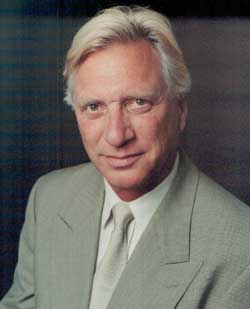Class News
A Letter from Frank Hotchkiss
April 4, 2000

I have practiced Buddhism for the last 30 years. "Practice" means it is a daily matter of meditating by chanting particular words.
Buddhism holds that the law of cause and effect is universal. You are the result of all causes you have made, so there is no place for self-pity or victimhood. The iniquities we see in our life (and in the lives of others) are accumulated from past causes, which carry from lifetime to lifetime. In the Buddhist view, our lives are not a book but a page in a book. Viewed singly, a page may not make sense, but read as a book, it does.
Enlightenment ― which is to say, living your life fully and meaningfully both for yourself and others ― is attainable in this lifetime through Buddhist practice. You just have to do it!
My personal experience has been that the longer you practice, the more you see things as they are and not as you wish they were. Then you know better how to deal with them. You end up a much happier person.
End of Buddhist commercial.
Speaking of being happy, my wife Sandi and I moved to Santa Barbara several years ago, 90 miles north of LA. We both have small business which are primarily electronic, so locus was no problem. I have a PR agency, and she has an advertising specialty business.
For the last few years I have turned to fiction writing (I was a journalist for years) and have churned out several screenplays and two novels. To my delight, an agent in NYC read and loved the books and is now taking them around to publishers.
The first book is about an older guy who falls wildly in love with a much younger woman despite his quite happy marriage. (I had to convince my wife that it was not biographical before I let her read it.) It's called Deceptions, and it deals with the question of passion vs. something more lasting.
Having written that, I wondered if it were just a fluke and decided to tackle another. I had read Tolstoy's Death of Ivan Ilyich, about a bureaucrat who unexpectedly gets sick (cancer is the implication) and how he copes with it ― which is not very well. He ends up screaming for the last 48 hours of his life. (Interestingly, Tolstoy also had a strange death, alone in a train station, I read somewhere.)
I thought Tolstoy's take on death was all wrong (presumptuous of me, but you know us Buddhists), so I set out to write an opposing novel that viewed death in a positive way. It's called Just A Common Man. The protagonist discovers he has only a short time left to live, so he decides to try and figure out if he led his life meaningfully or just let it slip through his fingers.
The remainder of the book is his odyssey to find out. It's called Just A Common Man because that's what he is, and part of his goal is to discover if ordinary people like himself can be said to have lived valuably or not. It's quite funny and also (of course) poignant. He falls in love with his doctor, an Iranian immigrant who knows he is terminal and is determined to have nothing to do with him emotionally ―- but she fails in that regard. I chose the literary vehicle of having him visit old friends, all from high school, to see what they had learned about life, and if it corresponded with what he felt. He dies in the end, but his death is a re-play of one of the great moments in his life when he won a football game by kicking the winning field goal in the final seconds. In other words, he wins in life and death as well.
By the way, I told Tom Barton, our classmate and my sophomore roommate, about the books and what they dealt with, and he asked if I had been living in his house, so I think the subjects are quite universal! I hope they are in print soon.
FYI, Jeff Franz from our class (whom I didn't know) tracked me down through the Internet and stopped by on his bicycle tour of Southern California. We had a delightful cup of coffee together.
Best to everyone.
Sincerely,
Frank Hotchkiss

